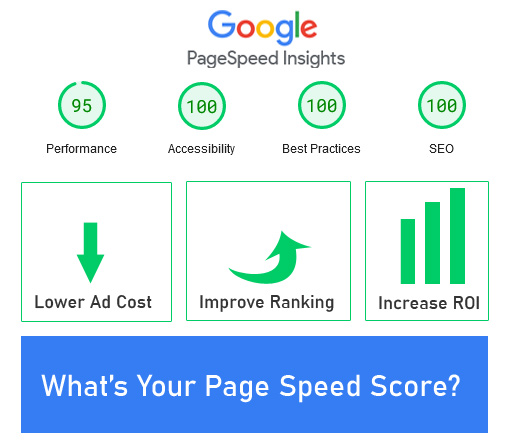Page Speed Matters!
We Optimize Your Website’s Page Speed To Obtain The Highest Search Engine Advantage Over Your Competitors.
- Do you need more traffic?
- Are you spending too much on search engine ads?
- Are you spending money on SEO and not seeing results?
- Do you want to improve your organic search engine ranking?

The Importance Of Page Speed
Instantaneous results are the norm of the digital era. Therefore, it is no surprise that website page speed has emerged as a critical component of user experience. Search engines prioritize those websites with faster page speeds as it will have a profound impact on how users interact with the site. Quick pages reduce bounce rates, improve conversion rates, and keep users engaged.What Is Website Page Speed?
Website page speed refers to the time it takes for a webpage to load after a user clicks on a link or types in a URL. Influenced by various factors, page speed is affected by the web hosting service, the size and format of images and videos, the efficiency of the code, the number of redirects, and amount of program scripts that make the site function properly.A Delay Of Only 1 Second Can Result In 7% Fewer Conversions!
Impact on User Experience
The user experience (UX) is paramount in website design and functionality. In our fast-paced online environment, users expect quick and responsive web interactions. Slow-loading websites will lead to users who abandon a site that doesn’t load within a few seconds.
Studies have shown that a delay as short as one second can result in a 7% reduction in conversions. Think about the money you lose if 7% of your customers do not convert each month.
- For every $10,000 in sales, you may be losing $700 due to a 1 second delay in page speed!
- For every $50,000 in sales, you may be losing $3,500.
- For every $100,000 in sales you may be losing $7,000.
Keep in mind this loss is for only a one second delay. What about two or three second delays?
Search Engine Ad Ranking & Page Speed Correlation
How much are you also losing in search ad costs due to slow loading speeds?
Slow landing pages often times contribute to your ads to be ranked lower than your competitors and also increase your cost for the ads in order to maintain a higher ranking. Read what Google has to say…

Ads that are listed at the top of the page may not necessarily cost more than ads shown lower in rank. Google may prefer links from ads that lead to a faster loading website. Thus, they can list those advertisers higher on the page at a lower cost per click.
You can view your Mobile speed score in your Google Ads account for your landing pages in which ad clicks are redirected.
Influence on Organic Search Engine Optimization
Search engines aim to provide users with the best results for their queries. Page speed is an major factor as it directly impacts the user experience. Search engines, like Google, have included page speed as a ranking factor for both desktop and mobile searches.
Ranking Factor: Search algorithms favor websites that load quickly. Faster sites appear higher in search engine results pages (SERPs), leading to more visibility and a higher click-through rate (CTR).
User Experience: Slow-loading websites generate negative user signals, such as high bounce rates and low average time on page. Search engines consider these signals when ranking websites. Websites with poor performance will not rank as well with those who have a higher speed index.
A Fast Loading Website Is Essential To Convert Your Traffic Into Sales
First Impressions Matter: The first few seconds of interaction with a website can form a lasting impression. If a site loads quickly, users are more likely to view it.
Bounce Rate: This refers to the percentage of visitors who leave the site after viewing only one page. A high bounce rate is often associated with slow page loading times. If a site is sluggish, users are more inclined to leave without engaging with the content. Waiting for a page to load for a society with reduced attention spans is frustrating. You will lose customers.
User Retention: A fast-loading site can significantly improve user retention. Engaging content will only be effective if the users are willing to wait for it to load. Speed ensures the audience stays longer, which could lead to increased interaction and transactions.
Mobile Users: With the increasing use of mobile devices to access the internet, page speed becomes even more critical. Mobile users often rely on mobile data, which can be slower than a wired connection, making optimization for mobile speed essential. Search engines make sure that fast loading mobile sites have priority ranking. It is critical to keep your page speed optimal when using search ads. Otherwise, you will be spending more for advertising while still ranking lower than your competitors with faster websites.